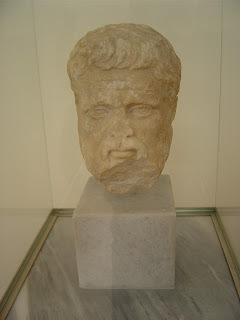translation
∞
Babel, in Paraphrase
Recently I have been wandering my city with a camera and sketchbook, looking at the ways our use and design of spaces speak about what we value.
Seeing often requires unhasty attention, or training, or both. I can't claim to have training in architecture, but I am trained in semiotics, and I suppose some of my grandfather's years as a toolmaker and my father's career as an engineer have rubbed off on me. Whatever the cause, I care about design.
The ancient story of the Tower of Babel (found in the eleventh chapter of the Book of Genesis) is also a story about design, and semiotics.
It's also a story worth unhasty attention. One hasty version goes roughly like this: everyone on earth shared a common language and common vocabulary. The people, moving to a new place, decided to build a tower to heaven, so they baked bricks and began to build. But they did not finish it; their language became many languages, and they spread out in many directions, divided from one another.
The Bible has a number of stories like this, short tales that seem to be making some simple and clear point. But as we ponder them unhastily - which is what theologians often do - we become more aware of how little we know. The obvious becomes the obscure, and the quotidien becomes mysterious.
A simple story becomes an invitation to slow down even more, and to consider. Selah, it says to us.
At first blush, the story of Babel appears to be a story of human hubris, and of God frustrating that hubris. It could be a simple parallel to the expulsion from Eden, or to the flooding of the earth in the story of Noah: there are limits, and if you transgress those limits, you will make your lot in life worse.
Lately, as I've slowed down my reading, I've been noticing something else: the bricks. The Bible does not often talk about the ethics of technology. There are passages that speak of things like the ethics of weaving, of sharing resources, and of the production, preparation, and distribution of food. But there are not many passages that name a particular human invention in the context of ethics. One of those inventions is named in several places: bricks.
The passage in Genesis 11 talks about bricks as a substitute for stone. When I was young I often worked as a stonemason and bricklayer. That experience may be what draws me to this passage. Bricks are easy to make, and easy to cut. We can standardize them, which makes building walls much faster.
The downside of bricks is related to their upside: they're easy to break, or to cut, or to erode. They don't last as long as stone, and if they're not well-reinforced, they are not as resilient against natural disasters. Some ancient stonemasons figured out how to cut and lay stones that can be jostled by an earthquake and then settle back into position, but bricks often collapse when the ground shakes beneath them. Bricks are easy to use, but they are not as reliable as stone. In comparison to many kinds of stone, bricks are a short-term investment.
This makes me wonder: what was the problem with the Tower of Babel? Was it the fact that the people were trying to build a tower to heaven? Or was it that they were trying to build one badly, or cheaply, or fast? Was it a problem of hubris, or a problem of materials and design? Genesis 11 does not answer that question directly. It leaves it as an open question for us.
Which is just what we should expect, if Genesis 11 conveys any truth. Think about this: how would this story have been told before the Tower of Babel was built? If the story is right, then before the Tower was built, the story would have been told in a language everyone would understand. But now that we have tried to build it (whatever that means) the story must be told in words that are confused, for people who are scattered and divided and who do not share vocabulary.
To paraphrase this: somehow, our use of bricks resulted in making it harder to connect with one another. And it's not clear how.
But somehow, it is a story that hundreds of generations have found worth repeating, even if our words fail to say with precision why that is so.
Maybe, just maybe, it has something to do with the way we continue to build walls of bricks. And what those bricks say about us, and what we value.
Since writing this, I started reading Christopher Alexander's book, The Timeless Way of Building, recommended to me by some friends in Sioux Falls. This line in particular stands out as serendipitous:
Seeing often requires unhasty attention, or training, or both. I can't claim to have training in architecture, but I am trained in semiotics, and I suppose some of my grandfather's years as a toolmaker and my father's career as an engineer have rubbed off on me. Whatever the cause, I care about design.
The ancient story of the Tower of Babel (found in the eleventh chapter of the Book of Genesis) is also a story about design, and semiotics.
It's also a story worth unhasty attention. One hasty version goes roughly like this: everyone on earth shared a common language and common vocabulary. The people, moving to a new place, decided to build a tower to heaven, so they baked bricks and began to build. But they did not finish it; their language became many languages, and they spread out in many directions, divided from one another.
The Bible has a number of stories like this, short tales that seem to be making some simple and clear point. But as we ponder them unhastily - which is what theologians often do - we become more aware of how little we know. The obvious becomes the obscure, and the quotidien becomes mysterious.
A simple story becomes an invitation to slow down even more, and to consider. Selah, it says to us.
At first blush, the story of Babel appears to be a story of human hubris, and of God frustrating that hubris. It could be a simple parallel to the expulsion from Eden, or to the flooding of the earth in the story of Noah: there are limits, and if you transgress those limits, you will make your lot in life worse.
The passage in Genesis 11 talks about bricks as a substitute for stone. When I was young I often worked as a stonemason and bricklayer. That experience may be what draws me to this passage. Bricks are easy to make, and easy to cut. We can standardize them, which makes building walls much faster.
The downside of bricks is related to their upside: they're easy to break, or to cut, or to erode. They don't last as long as stone, and if they're not well-reinforced, they are not as resilient against natural disasters. Some ancient stonemasons figured out how to cut and lay stones that can be jostled by an earthquake and then settle back into position, but bricks often collapse when the ground shakes beneath them. Bricks are easy to use, but they are not as reliable as stone. In comparison to many kinds of stone, bricks are a short-term investment.
*****
This makes me wonder: what was the problem with the Tower of Babel? Was it the fact that the people were trying to build a tower to heaven? Or was it that they were trying to build one badly, or cheaply, or fast? Was it a problem of hubris, or a problem of materials and design? Genesis 11 does not answer that question directly. It leaves it as an open question for us.
Which is just what we should expect, if Genesis 11 conveys any truth. Think about this: how would this story have been told before the Tower of Babel was built? If the story is right, then before the Tower was built, the story would have been told in a language everyone would understand. But now that we have tried to build it (whatever that means) the story must be told in words that are confused, for people who are scattered and divided and who do not share vocabulary.
To paraphrase this: somehow, our use of bricks resulted in making it harder to connect with one another. And it's not clear how.
But somehow, it is a story that hundreds of generations have found worth repeating, even if our words fail to say with precision why that is so.
Maybe, just maybe, it has something to do with the way we continue to build walls of bricks. And what those bricks say about us, and what we value.
*****
Update:Since writing this, I started reading Christopher Alexander's book, The Timeless Way of Building, recommended to me by some friends in Sioux Falls. This line in particular stands out as serendipitous:
"But in our time the languages have broken down. Since they are no longer shared, the processes which keep them deep have broken down: and it is therefore virtually impossible for anybody, in our time, to make a building live." (New York: Oxford University Press, 1979) p. 225
∞
Bless You!
What should you say when someone sneezes? I've been pondering this for years. Here are my reflections on that, by way of thinking about foreign-language pedagogy, and about what it means to bless someone:
The Emperor Charles V reportedly said that as many languages as a man knows, that many times over is he a man. I don't know if that's true, but in high school I took courage from it. I was athletic, but lean, with a great build for biking and running, but too slender to be considered dangerously manly. My only formal sports were swimming and ultimate frisbee. I loved skiing and hiking and rock-climbing, but the more I exercised, the leaner I got. There was no chance I'd ever become a star athlete, and I think that realization saved me from trying to become what I was not. Although I didn't know Emerson's writing back then, I nevertheless arrived at an Emersonian conclusion: there are as many kinds of manliness, and courage, as there are men and women to embody them. Emerson puts it like this:
This turns out to be a good way to learn one's own language, too. Not everything can be translated, and when you find something in your native tongue that's hard to say in another language, you've found something that is a unique possession of the speakers of your language. Or when you learn that one word in your language takes many forms in another language, you begin to see how your cultural heritage has come equipped with some blind spots. The same is true of grammar, of inflection, of syntax, and so on.
So learning another language is not simply a matter of replacing one vocabulary with another. Learning a language means learning a culture, a history, a literature.
(This is why language-learning software can help, but it's not enough, and it's no substitute for excellent teachers and for studying abroad.)
In middle school, as I was trying to actualize all my potential and to become as many men as I could be, I spent a lot of time learning basic phrases and grammar in other languages. How do you greet someone in this language? How do you say goodbye? How do you ask for what you want? These tend to be fairly straightforward in the languages I studied.
But some phrases were harder. How do you say "Please"? That word is, after all, a contraction of a whole clause, "If it please you," with a subjunctive verb. It's not like a name for an object or a place, which might be easily translated; it's a way of calling on a whole tradition of regarding the wishes of others as important - or at least, of pretending to honor those wishes. Now, most of the languages I studied had simple ways of saying "please," but along the way I discovered that not all English speakers consider "please" to be correct. Some religious communities, for instance, regard such words as unnecessary; we should be willing to give what we're asked for without demanding that the other regard our wishes as important, they reason.
Another phrase similarly exposed something about cultures: what do you say when someone sneezes? In many languages, the answer is that you say "Your health!" Many English speakers I know use the German Gesundheit without knowing that this is what they are saying, in another language. That's fascinating: we feel the need to say something, even if we don't know what the word means.
When I first met my frosh college roommate, Nick, he sneezed. I said the customary thing: "Bless you!" He looked at me oddly, and didn't say anything. Over the coming weeks, I repeated the phrase each time he sneezed. Finally, he asked me "Why do you keep saying that?" I realized I hadn't any better answer than to say that's what I heard others do. His question got me wondering why we acknowledge sneezes.
After all, we don't say something to accompany other bodily functions, do we? Is there a stock phrase for hiccups, or burps? For a rumbling belly? A cough? A yawn?
Over the years, it started to bother me that others felt the need to comment on my sneezes. When I ask people why they do it, I usually get some lame reply about how it's because long ago people believed that sneezes were a sign of some dangerous spiritual or physical ailment; or that it had to do with fear of the Black Plague; or that it was a response to the fear that sneezes were signs of demonic possession; and in any case, sneezes needed to be countered with blessings.
Okay, fine. I'll let the Middle Ages off the hook next time they bless my sneezing. But why do YOU do it? The answer seems to be cultural habit. It's not a necessity of nature, but something we've made ourselves do until we've forgotten why we do it. It's a thoughtless reflex, and I think this is what annoys me.
Now, after years of being a curmudgeon and a grouch about this, I'm starting to reconsider my objection to these responses to my sternutations. On the one hand, these blessings are thoughtless, and they demand a reply of "thank you" when frankly, I'm still recovering from a sneeze and would rather not say anything. On the other hand, perhaps we shouldn't want fewer blessings in our lives, but more of them, or at least more sincere ones.
As I think back over my life, I've received these blessings often from strangers on a bus or a subway, or in a park in a foreign city. People who do not know me stop their activity to speak a word of blessing into my life, to look me in the eye and put into simple words their wishes for my good health.
Speaking does not make things so, not instantly, anyway. But putting things into words is nevertheless very powerful. I'm not talking magic here; I'm talking about the way our words affect ourselves and others. Naming is powerful. When our inarticulate anger or frustration evolves into naming someone as the one who needs to be punished, the person becomes a criminal, something less than a person. The greater the crime, the lesser the human. Because naming is powerful, cursing is powerful. Which is why I taught my kids that it's not words that are bad, but the uses of words.
And if history teaches us anything at all, it shows us how easy we find it to curse others, to come up with simple, curt, dehumanizing names for entire classes of others. We find it easy not to look others in the eye but to look no further than the skin, or to look through others as though they were not there. We find it easy to curse those who live across borders of towns and nations, those who drive in front of us or behind us, those whose faces we never see and whom we know only through a few words we've read online.
In light of that, I suppose that if you want to bless me--indeed, if you find it hard not to bless me--that should be a welcome thing. Just give me a minute to recover from my sneeze before I thank you. And may you be blessed, too.
The Emperor Charles V reportedly said that as many languages as a man knows, that many times over is he a man. I don't know if that's true, but in high school I took courage from it. I was athletic, but lean, with a great build for biking and running, but too slender to be considered dangerously manly. My only formal sports were swimming and ultimate frisbee. I loved skiing and hiking and rock-climbing, but the more I exercised, the leaner I got. There was no chance I'd ever become a star athlete, and I think that realization saved me from trying to become what I was not. Although I didn't know Emerson's writing back then, I nevertheless arrived at an Emersonian conclusion: there are as many kinds of manliness, and courage, as there are men and women to embody them. Emerson puts it like this:
“It is he only who has labor, and the spirit to labor, because courage sees: he is brave, because he sees the omnipotence of that which inspires him. The speculative man, the scholar, is the right hero. Is there only one courage, and one warfare? I cannot manage sword and rifle; can I not therefore be brave? I thought there were as many courages as men. Is an armed man the only hero? Is a man only the breech of a gun, or the hasp of a bowie-knife? Men of thought fail in fighting down malignity, because they wear other armour than their own.”So I threw myself into doing what I was made to do with joy, and to living a brave life in my own way. Some people find learning a foreign language terrifying; I do not. I'm one of those people blessed with an unusual ability to learn foreign languages quickly and with little effort. When I'm around a new language, I listen to its music and its rhythms and make them my own, and I begin to take apart the language as I hear it, so I can think with it, and watch its parts move. And I ask a lot of questions: How do you say this in your language? What does this mean? When do you say that?– R.W. Emerson, Commencement Address given at Middlebury College on July 22, 1845, in Emerson At Middlebury College, Robert Buckeye, ed. (Middlebury, Vermont: Friends of the Middlebury College Library, 1999), p. 39.
This turns out to be a good way to learn one's own language, too. Not everything can be translated, and when you find something in your native tongue that's hard to say in another language, you've found something that is a unique possession of the speakers of your language. Or when you learn that one word in your language takes many forms in another language, you begin to see how your cultural heritage has come equipped with some blind spots. The same is true of grammar, of inflection, of syntax, and so on.
So learning another language is not simply a matter of replacing one vocabulary with another. Learning a language means learning a culture, a history, a literature.
(This is why language-learning software can help, but it's not enough, and it's no substitute for excellent teachers and for studying abroad.)
In middle school, as I was trying to actualize all my potential and to become as many men as I could be, I spent a lot of time learning basic phrases and grammar in other languages. How do you greet someone in this language? How do you say goodbye? How do you ask for what you want? These tend to be fairly straightforward in the languages I studied.
But some phrases were harder. How do you say "Please"? That word is, after all, a contraction of a whole clause, "If it please you," with a subjunctive verb. It's not like a name for an object or a place, which might be easily translated; it's a way of calling on a whole tradition of regarding the wishes of others as important - or at least, of pretending to honor those wishes. Now, most of the languages I studied had simple ways of saying "please," but along the way I discovered that not all English speakers consider "please" to be correct. Some religious communities, for instance, regard such words as unnecessary; we should be willing to give what we're asked for without demanding that the other regard our wishes as important, they reason.
 |
| Modern saints at Westminster Abbey; Their stories are a blessing. |
When I first met my frosh college roommate, Nick, he sneezed. I said the customary thing: "Bless you!" He looked at me oddly, and didn't say anything. Over the coming weeks, I repeated the phrase each time he sneezed. Finally, he asked me "Why do you keep saying that?" I realized I hadn't any better answer than to say that's what I heard others do. His question got me wondering why we acknowledge sneezes.
After all, we don't say something to accompany other bodily functions, do we? Is there a stock phrase for hiccups, or burps? For a rumbling belly? A cough? A yawn?
Over the years, it started to bother me that others felt the need to comment on my sneezes. When I ask people why they do it, I usually get some lame reply about how it's because long ago people believed that sneezes were a sign of some dangerous spiritual or physical ailment; or that it had to do with fear of the Black Plague; or that it was a response to the fear that sneezes were signs of demonic possession; and in any case, sneezes needed to be countered with blessings.
Okay, fine. I'll let the Middle Ages off the hook next time they bless my sneezing. But why do YOU do it? The answer seems to be cultural habit. It's not a necessity of nature, but something we've made ourselves do until we've forgotten why we do it. It's a thoughtless reflex, and I think this is what annoys me.
Now, after years of being a curmudgeon and a grouch about this, I'm starting to reconsider my objection to these responses to my sternutations. On the one hand, these blessings are thoughtless, and they demand a reply of "thank you" when frankly, I'm still recovering from a sneeze and would rather not say anything. On the other hand, perhaps we shouldn't want fewer blessings in our lives, but more of them, or at least more sincere ones.
As I think back over my life, I've received these blessings often from strangers on a bus or a subway, or in a park in a foreign city. People who do not know me stop their activity to speak a word of blessing into my life, to look me in the eye and put into simple words their wishes for my good health.
Speaking does not make things so, not instantly, anyway. But putting things into words is nevertheless very powerful. I'm not talking magic here; I'm talking about the way our words affect ourselves and others. Naming is powerful. When our inarticulate anger or frustration evolves into naming someone as the one who needs to be punished, the person becomes a criminal, something less than a person. The greater the crime, the lesser the human. Because naming is powerful, cursing is powerful. Which is why I taught my kids that it's not words that are bad, but the uses of words.
And if history teaches us anything at all, it shows us how easy we find it to curse others, to come up with simple, curt, dehumanizing names for entire classes of others. We find it easy not to look others in the eye but to look no further than the skin, or to look through others as though they were not there. We find it easy to curse those who live across borders of towns and nations, those who drive in front of us or behind us, those whose faces we never see and whom we know only through a few words we've read online.
In light of that, I suppose that if you want to bless me--indeed, if you find it hard not to bless me--that should be a welcome thing. Just give me a minute to recover from my sneeze before I thank you. And may you be blessed, too.
∞
"I Know That I Don't Know"?
If you stroll through the Plaka tourist district in Athens, you'll have ample opportunities to buy t-shirts and other items with the slogan "en oida oti ouden oida," most of which will attribute this saying to Socrates. It means "I know this one thing: that I know nothing."
Of course, it is a little silly and possibly self-contradictory, since knowing one thing means knowing something, while knowing nothing precludes knowing something.
Still, if Socrates said it, it's worth repeating, right? (For kicks, Google it and see how many times it is quoted authoritatively.)
But I wonder if Socrates ever said it at all.
Yes, I know that we don't know exactly what Socrates said. Socrates left us no writings, and as for transcriptions of his conversations, we have only three first-hand sources to rely on: those of Plato and Xenophon his students, and of Aristophanes his ostensible rival. It seems likely that Aristophanes did not attempt to represent Socrates accurately, nor as a philosopher. Plato may well have invented much of Socrates' dialogue as well, but he also had a stake in continuing and defending the philosophical work of Socrates in Athens.
For this reason, when philosophers refer to Socrates, we are usually referring to the Socrates found in Plato's rather extensive writings.
So did Plato's Socrates ever say "en oida oti ouden oida"? It appears not.
The closest thing I've found is a passage in Plato's Apology of Socrates, where Socrates says something that should really be translated as something like this: I do not claim to know those things that I do not know.
This is not only more reasonable, it's also good advice: don't pretend to know what you don't know and you'll avoid a lot of trouble.
It's important for another reason, though. The "en oida oti ouden oida" quote seems to be something of a staple of frosh philosophy texts and classes.
The danger here is that we will present an ancient philosopher (two of them, in this case) as though he were fairly foolish; and as a result, we will not take ancient philosophy seriously.
All it should take to cure this is a quick look at the Greek text of any of Plato's dialogues. The Phaedo, for instance, bears a slow and careful read in Greek, since no translation I've found captures all the wordplay. And as Peirce pointed out, when one reads the Greek, one discovers something else that the translators often veil from our sight: Plato's Socrates uses the language of syllogism in a way that shows that he was doing Aristotelian logic before Aristotle was.
By relying on hearsay rather than on engagement with the primary texts, we close off a path of inquiry into a whole set of ancient philosophical texts. "Doesn't their being ancient mean that they are exhausted?" you may ask. Old trees, it seems to me, may still bear rich fruit. And just as we find that old caves sometimes have rich troves of ancient unread texts, what else might we find if we take the time to read the ancients closely?
Of course, it is a little silly and possibly self-contradictory, since knowing one thing means knowing something, while knowing nothing precludes knowing something.
Still, if Socrates said it, it's worth repeating, right? (For kicks, Google it and see how many times it is quoted authoritatively.)
But I wonder if Socrates ever said it at all.
Yes, I know that we don't know exactly what Socrates said. Socrates left us no writings, and as for transcriptions of his conversations, we have only three first-hand sources to rely on: those of Plato and Xenophon his students, and of Aristophanes his ostensible rival. It seems likely that Aristophanes did not attempt to represent Socrates accurately, nor as a philosopher. Plato may well have invented much of Socrates' dialogue as well, but he also had a stake in continuing and defending the philosophical work of Socrates in Athens.
For this reason, when philosophers refer to Socrates, we are usually referring to the Socrates found in Plato's rather extensive writings.
So did Plato's Socrates ever say "en oida oti ouden oida"? It appears not.
The closest thing I've found is a passage in Plato's Apology of Socrates, where Socrates says something that should really be translated as something like this: I do not claim to know those things that I do not know.
This is not only more reasonable, it's also good advice: don't pretend to know what you don't know and you'll avoid a lot of trouble.
It's important for another reason, though. The "en oida oti ouden oida" quote seems to be something of a staple of frosh philosophy texts and classes.
The danger here is that we will present an ancient philosopher (two of them, in this case) as though he were fairly foolish; and as a result, we will not take ancient philosophy seriously.
All it should take to cure this is a quick look at the Greek text of any of Plato's dialogues. The Phaedo, for instance, bears a slow and careful read in Greek, since no translation I've found captures all the wordplay. And as Peirce pointed out, when one reads the Greek, one discovers something else that the translators often veil from our sight: Plato's Socrates uses the language of syllogism in a way that shows that he was doing Aristotelian logic before Aristotle was.
By relying on hearsay rather than on engagement with the primary texts, we close off a path of inquiry into a whole set of ancient philosophical texts. "Doesn't their being ancient mean that they are exhausted?" you may ask. Old trees, it seems to me, may still bear rich fruit. And just as we find that old caves sometimes have rich troves of ancient unread texts, what else might we find if we take the time to read the ancients closely?




